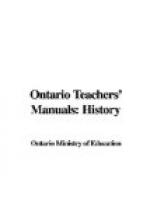Two points stand out clearly—to teach the machinery of government and to instil ideals of public conduct. Of these the second is by far the more important and the more difficult to teach directly. The best way to attempt it is by means of biography and personal references. There are great men and women in history whose lives are worthy examples to the young: Sir John Eliot, Pym, Hampden, who stood for freedom of speech and debate; Gladstone, who helped to right historic wrongs in the East; Lincoln, who stood for union and the freedom of the individual; many eminent Canadians, such as Sir John Macdonald, George Brown, Alexander Mackenzie, Egerton Ryerson, Sir Oliver Mowat, and Sir James Whitney; women such as Florence Nightingale and Elizabeth Fry, Laura Secord and Sarah Maxwell. Besides these eminent examples, there are in every locality men and women who give unselfishly of their energy and time for the good of the community.
There should also be impressed on the minds of the young a sense of their responsibility for an honest and faithful use of the ballot, a right won for them by the long and earnest effort of their forefathers; and the necessity for purity of government in our democratic form of administration. In school life, a good deal can be done to create a sense of fair play, respect for the rights of others, and of the necessity for submission to lawful authority by encouraging the pupils to conduct all their school organizations, whether in play or in work, honourably and by right methods.
Some of the lessons that may be taught to children during their school life are as follows:
1. Respect for the rights of others. Pupils may be brought to see that misconduct on their part affects others, not themselves only.
2. Respect for the property of others. This may be secured best by teaching them to take good care of their own property first, for unless a child cares rightly for his own, he is not likely to take much thought for the things of others.
3. Respect for public property. This is something that needs attention badly. It is a very common thing to find people destroying trees, flowers, etc., in public places, throwing refuse on the street, and otherwise disfiguring their surroundings. A beginning of better habits may be made by getting the pupils to aid in beautifying and decorating the school building by means of pictures, either prints or their own work, by flowers in pots, by keeping the floor and walls clean and free from marks and litter; also in making the grounds around the school more attractive by means of flowers and shrubs. Arbor Day may be made of great use in this respect, if the spirit of that Day can be carried through the whole year. A pride in the attractiveness of the school will have its influence on the pupils in the wider life of the community.
A knowledge of the machinery of government may be based on the pupils’ knowledge of the organization of the school. The appointment, power, and duties of the teacher are the starting-point. The next step will be to investigate the composition of the board of school trustees. This may be done at the time of an election for school trustees. The following questions may serve as an outline of study for all the political bodies by which we are governed:




